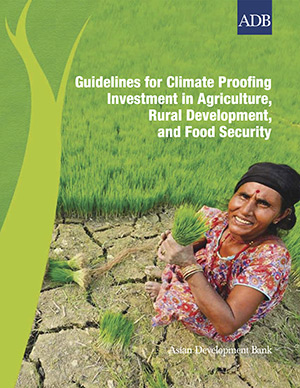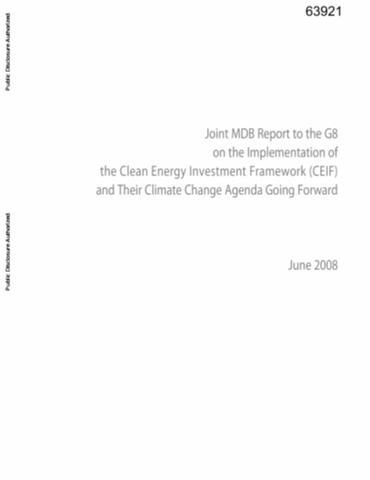The Asian Development Bank was conceived in the early 1960s as a financial institution that would be Asian in character and foster economic growth and cooperation in one of the poorest regions in the world.
As a multilateral development finance institution, ADB provides:
- loans
- technical assistance
- grants
Our clients are our member governments, who are also our shareholders. In addition, we provide direct assistance to private enterprises of developing member countries through equity investments and loans.
ADB maximizes the development impact of its assistance by
- facilitating policy dialogues,
- providing advisory services, and
- mobilizing financial resources through cofinancing operations that tap official, commercial, and export credit sources
Members:
Resources
Displaying 21 - 25 of 37Guidelines for Climate Proofing Investment in Agriculture, Rural Development, and Food Security.
This publication, Guidelines for Climate Proofing Investment in Agriculture, Rural Development, and Food Security, aims to present a step-by-step methodological approach to assist project teams to assess and incorporate climate change adaptation measures into agriculture, rural development, and food security investment projects. While the guidelines focus on the project level, an improved understanding of climate change impacts should also be used to incorporate climate change considerations into agriculture planning and policy at the country level.
Asian Development Bank Interim Country Partnership Strategy: Myanmar, 2012-2014 SECTOR ASSESSMENT (SUMMARY): URBAN DEVELOPMENT AND WATER SECTORs
1 Sector Road Map: 1. Sector Performance, Problems, and Opportunities - 1. Urbanization; 2. Core constraints ["The core constraint to Myanmar’s urban development is inadequate
infrastructure and poor quality of services..."]; Sector performance indicators ["A key constraint in assessing the sector performance
and having a basis for planning and prioritization are the sporadic, unreliable and incomplete
data..."]; 4. Sanitation, solid waste and stormwater drainage ["Urban areas do not have
Legal Empowerment for Women and Disadvantaged Groups
Joint MDB Report to the G8 on the Implementation of the Clean Energy Investment Framework and Their Climate Change Agenda Going Forward
The 2005 Gleneagles G8 summit in July 2005 stimulated a concerted effort of the Multilateral Development Banks (MDBs) to broaden and accelerate programs on access to energy and climate change mitigation and adaptation through the Clean Energy Investment Framework (CEIF). At the Gleneagles summit, it was agreed that a report on the implementation of the CEIF would be prepared for the 2008 G8 (Group of Eight: Canada, France, Germany, Italy, Japan, Russia, the United Kingdom, and the United States) summit hosted by Japan.
Gender Strategy in Agriculture and Rural Development to the Year 2010
The renovation process in Vietnam in the past decade has enabled significant economic growth as well as and greater rights and more important economic roles of farming households. However, much of this reform has focussed on men as head of households, meaning men have benefited more from economic reform, both economically and in terms of their power within the household. Inequalities continue in access to and control of key resources such as land, water, credit and rest time, as well as in access to public services.






